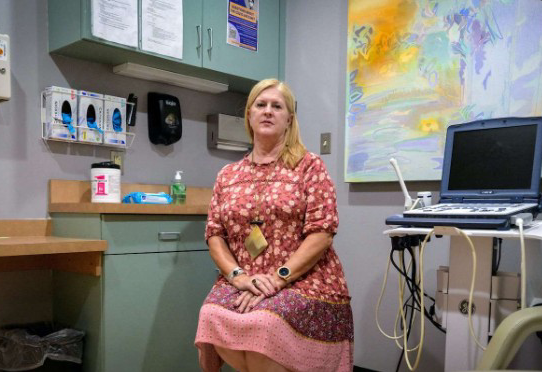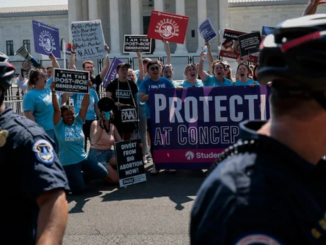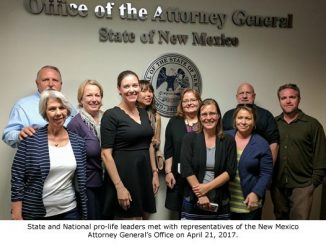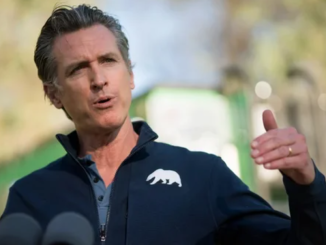
it on fire. The arson remains unsolved. Just a few weeks later, the Supreme Court ruled in the Dobbs case, paving the way for Wyoming’s new abortion ban to take effect. “This is a decisive win for those who have fought for the rights of the unborn for the past 50 years,” Republican Gov. Mark Gordon said.
Despite the setbacks, Burkhart and her allies are moving ahead. The Casper clinic is being rebuilt, and a mobile clinic is in the works. If it all sounds a tad optimistic given the bleak outlook for abortion access, that’s because while federal protections for abortion have been decimated, state protections, and specifically those found in state constitutions, have not. Abortion rights advocates in Wyoming are confident that their state’s founding document speaks clearly that abortion is a right, and they’re fighting in state court to prove it.
just a quiet affair, Waatti-Thompson said, but it has since grown into something akin to “street theater.”
The protests are coordinated by Bob Brechtel, a former state representative who has boasted that the anti-abortion demonstrators come from 37 different churches and that he intends to keep protesting as long as necessary. “Rule of law is important,” he told Kaiser Health News, “but what’s more important is that we do have people who are accepting and understanding of our purpose to defend human life at all stages.”
Ironically, it is work Brechtel did while in the Wyoming Legislature that has buoyed the hopes of folks like Burkhart that abortion will remain legal in the state and plans for a brick-and-mortar clinic will be realized.
Back in 2011, Brechtel was a House sponsor of the state Senate’s “Health Care Freedom” resolution, which aimed to enshrine health care access into the state’s constitution. The resolution led with the broad promise that “each competent adult shall have the right to make his or her own health care decisions.” Additional provisions included a right to pay for health care out of pocket and a commitment that the state would “act to preserve these rights from undue governmental infringement.”
The resolution was filed in reaction to Congress passing the Affordable Care Act. State lawmakers were dismayed by the notion that Wyomingites might be forced into purchasing health insurance and wanted to push back. Floor debates on the resolution were limited, and while some lawmakers pointed directly to the ACA as the reason for their support, others talked about health care — and government overreach — more broadly. “We don’t agree with government from the highest possible level enforcing something so intimate as the health care decisions that we make for ourselves and for our children,” then-state Rep. Amy Edmonds told her colleagues.
The resolution easily passed, and in November 2012, 73 percent of voters cast a ballot in favor of adding a new section to the state constitution. The right of health care access laid out in Article 1, Section 38 is now at the center of efforts to protect abortion rights in the state.
Health Care Freedom
In 1920, the town of Jackson, in Teton County, became the first in Wyoming to be governed entirely by elected women. The press dubbed the administration the “petticoat government.” In 1922, Mayor Grace Miller summed up their approach to governing: “We simply tried to work together,” she said. “What is good government but a breathing space for good citizenship?”
On July 25, Burkhart and five other female plaintiffs picked up that mantle and filed suit in Teton County seeking to block the state’s abortion ban, which was slated to take effect two days later. Burkhart’s clinic and Lichtenfels’s abortion fund joined two doctors, a pregnant emergency room nurse, and a third-year law student to argue that the ban, which contains only narrow exceptions, violated multiple provisions of the Wyoming Constitution, including the explicit guarantee of Article 1, Section 38.
If the law went into effect, they argued, “Wyomingites, and especially women, lose their right to decide whether and when to become parents; their right to determine the composition of their families; their entitlement to be free from discriminatory state laws that perpetuate stereotypes about women and their proper societal role; their right to bodily integrity and to be free from involuntary servitude; their freedom of conscience; their right to access appropriate health care and make private health care decisions; and their right to bodily autonomy and liberty.”
In response, the state has tossed a mishmash of arguments at District Judge Melissa Owens to explain why the Wyoming Constitution doesn’t protect abortion. Special Assistant Attorney General Jay argues that interpretation of the state constitution is somehow tethered to Supreme Court interpretations of the federal Constitution — in other words, that because the Supreme Court says there’s no federal protection for abortion, one can’t be found anywhere in the Wyoming Constitution.
As for concerns that the state’s ban is vague — and would leave doctors and patients unsure of the conditions under which abortion is legal, as has happened across the country — there is a simple fix, Jerde says: Just remove the ban’s exceptions for the health of the pregnant person and cases of rape and incest. “There’s nothing vague about this statement: ‘No abortion shall be performed,’” he told Owens during an August court hearing.
Then there are the state’s claims about why the protections afforded by Article 1, Section 38 simply don’t apply. For starters, the amendment only protects an individual’s right to choose among “health care services” that Wyoming politicians have decided are legal, according to Jerde; if the Legislature has decided abortion isn’t legal, then there’s no right to it.
And he argues that the point of the amendment was solely to protect Wyoming residents from having to pay for insurance under the ACA — that is, the promise to defend health care freedom from “undue government infringement” only applies to federal overreach, not state infringements.
To properly understand the amendment’s guarantees, Jerde argues, the court must determine what lawmakers intended in passing the resolution and what voters thought when they cast their ballots. And since the amendment doesn’t contain the word abortion, “no voter … could reasonably believe that, in voting to ratify section 38, she was amending the Wyoming Constitution to implicitly confer the right to abortion.”
abortion ban should be blocked during the pendency of the litigation. She noted that because the ban singles out those who can become pregnant and impermissibly “restricts” their health care rights, the plaintiffs would likely be successful on several of their constitutional claims. “Discrimination on the basis of sex is explicitly prohibited under the Wyoming Constitution,” she wrote.
Live and Let Live
When state Rep. Pat Sweeney joined the Wyoming House in 2017 as a Republican representing Natrona County, where Casper is located, he didn’t consider himself pro-choice. He’d spent years in the hospitality business, owning a hotel, bar, and steak joint in town. He worked around employees from all walks of life and saw abortion as health care, but he hadn’t really thought much more about it.
But after nearly 30 years of rejecting abortion restrictions, state lawmakers appeared on track to pass several that year. Sweeney sat on the Labor, Health, and Social Services Committee. He remembers listening to hours of testimony and thinking to himself, “What gives a bunch of older white men in the Legislature … the right to take these fundamental rights away from women?” After he voted no on one measure, he recalls being confronted by Brechtel, the former state representative behind the anti-abortion protests, and Frank Eathorne, now the controversial chair of the state GOP. “‘You claim to be a Republican?’” he says Eathorne asked. “Very insulting and very demeaning, he and Bob Brechtel … so that has stuck with me.”
That kind of nastiness has washed over the state Republican Party, said Sweeney — who voted for Donald Trump twice (his policies were good for the state’s extraction industries, he said) and recently lost his reelection bid — and was on full display during debates over the trigger bill in February. Sweeney recalled watching as a female colleague made an impassioned speech against the measure while the bill’s sponsor, Rep. Rachel Rodriguez-Williams, stared her down, “just won’t take her eyes off her, with a shit-eating grin. And I’m thinking, ‘Wow, do you have no respect for anybody except your point of view, and only your point of view?’” he said. “Just open your mind a little bit, would you? But she didn’t.”
Rodriguez-Williams, the executive director of a crisis pregnancy center in Cody, has now joined with Right to Life of Wyoming in an attempt to intervene in the lawsuit over the ban. In a brief filed in Owens’s court, lawyers with the Alliance Defending Freedom, a far-right Christian legal organization that the Southern Poverty Law Center has designated a hate group, argued that the state wasn’t putting on the kind of evidence needed to demonstrate the legality of the ban — including an assertion that abortion isn’t actually health care. Owens hasn’t yet ruled on their request.
In the meantime, Burkhart’s mobile abortion clinic is on track to open in November. A new round of renovations to Wellspring Health Access is well underway. The clinic still sees weekly anti-abortion protests, and the investigation into the arson is ongoing. With all the setbacks and legal wrangling, Burkhart says that people have asked her why she’s pressing forward. She’s motivated by the patients who need care and the memory of her mentor, George Tiller. “Tiller always said, ‘solutions, not problems.’”
Sweeney joined Burkhart for an abortion rights rally in Casper this spring, where he urged people to vote and run for office. He hopes that Wyomingites can return to talking respectfully to one another and to their live-and-let-live roots. Members of the advisory committee were at the rally too: Kee, Waatti-Thompson, and Ifland spoke. So did Riata Little Walker.
Back on Ifland’s patio in Casper, Little Walker, a native Wyomingite and “traditional Republican,” said that if you’d asked her a few years ago, she would’ve said she was pro-life, with exceptions for incest and rape. “That’s all that had ever been presented to me as an issue,” she said. “My perspective … was very narrow.” Then she got married and pregnant. “And everything was wonderful,” she said. Until it wasn’t. At 21 weeks, they found out the fetus was very sick. Little Walker had to travel to Denver for help, where she had a choice of termination or induced labor and delivery. She chose the latter. The couple held their daughter “and she died in our arms.”
The experience was transformative. Little Walker realized that the notion that all terminations were of pregnancies that would have developed into healthy babies was nonsense. She thought that discussing termination for medical reasons would be a “good bridge for the people who are uncomfortable with the whole abortion thing and thinking that you’re killing a perfectly healthy, innocent baby just because somebody doesn’t want it,” she said. “And we all know how absurd that argument is.”
She reached out to Breitweiser of Pro-Choice Wyoming and began testifying at the legislature. Her message: “It’s not black and white.” Her goal is to get people to think more deeply about the issue, and to understand that legislation like Wyoming’s ban takes choice and health care away from everyone in every situation, including the most dire. If you can “get them to start thinking about it,” she said, then “you can slowly get there.”
* Article from: theintercept.com


